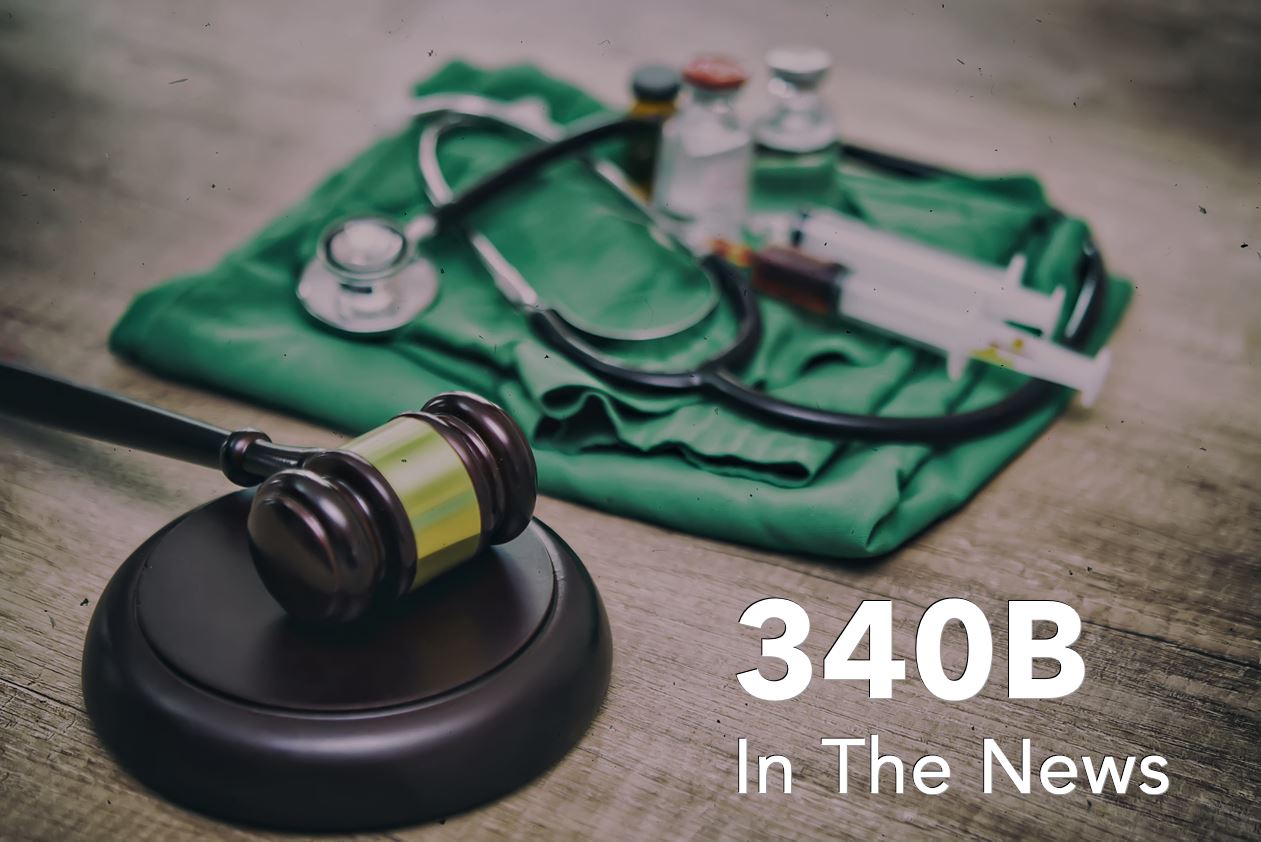In the past week, no less than three articles have called attention to the restrictions drug manufacturers have imposed to evade their legal responsibility to honor 340B program prescription discounts — as well as the impact those restrictions have had on 340B-eligible nonprofit entities’ ability to serve their patients and communities.
“Don’t believe drug companies: 340B is a program worth saving”
On Tuesday, August 8, 2023, The Hill published a guest editorial (title above) by John Hassell — national director of advocacy at the AIDS Healthcare Foundation (AHF).
In the column, Hassell calls-attention to an earlier op-ed column published by The Hill as “yet another example of a drug company-focused view on the 340B Drug Pricing Program, couched in the language of reform.”
“Its criticisms,” he continues, “apply a familiar formula. First, start with presenting drug company-funded research as if it is non-biased. Next, use misleading statistics to accuse safety-net providers of abusing the program. After that, offer faux concerns about wanting to protect medically underserved patients.
“Then go even further: Blame nonprofits for the 340B savings siphoned off by pharmacy benefit managers. Finish it all off by sprinkling in quotes from activists who have direct relationships with drug companies or organizations that have represented them. And voila, you have a smear with the veneer of legitimacy.
“All of the drug industry’s criticisms and so-called 340B ‘reform proposals,’” he concludes, “culminate in one goal, which is to limit the number of prescriptions available at 340B prices. This would inevitably prioritize drugmaker balance sheets over the clinical outcomes of vulnerable Americans.”
Making the rich richer at the expense of the poorest and most vulnerable.
In a previous article published here, we noted that – – As demonstrated in a report by the health-economics consulting firm Dobson|DaVanzo & Associates and commissioned by 340B Health (a non-profit membership organization of more than 1,400 public and private nonprofit hospitals and health systems), 340B Disproportionate Share Hospitals (DSH) provided 67 percent of all uncompensated care in 2020.
In fact, the report found, 340B DSH hospitals provided $41 billion in uncompensated care in 2020 alone. And that’s despite average health system operating margins of -6.1% — a figure more than 74% lower than the -3.5% operating-margin average for 340B DSH hospitals in 2019.
When it comes to uncompensated care, the term Disproportionate Share couldn’t be more accurate. In 2020, the average 340B DSH hospital provided $38 million in uncompensated care — while the average non-340B hospital provided just over $14 million…
…Why did the manufacturers impose 340B discount restrictions?
It’s hard to find any explanation more compelling, or accurate, than sheer greed. After all, as reported in a March, 2021 Fact Sheet published by the American Hospital Association, the total value of the 340B program amounts to just 5% of the U.S. drug market. Moreover, even with the quote-unquote “lost revenues” drug manufacturers associate with the program, the industry’s S&P 500 companies generate, on average, nearly double (or 179%) the profits of non-pharmaceutical companies on the S&P (13.8% margins vs. 7.7% margins).
How effective have 340B ESP and other restrictions been in enabling drug manufacturers to avoid their legal obligations to 340B-eligible hospitals — while adding to their already overstuffed coffers? In the first year of its alliance with 340B ESP, Merck alone saved $2 billion. Money which could (and would, as demonstrated clearly by the research) have been used by eligible hospitals to better serve the most financially-vulnerable patients in their communities.
Assailing intentionally-flawed drug manufacturer 340B math
In his column, Hassell also spotlights the patently misleading statistics drug manufacturers use to defend their criticisms of the 340B program as a profiteering ploy by 340B-eligible entities at the expense of US taxpayers:
“Contrary to claims made by 340B critics,” he continues, “we are not sitting on record-breaking profits. Unlike drug companies, we are not focused on turning a buck. Even more importantly, [our] use of 340B does not cost American taxpayers a single dime. Nonprofits like AHF reinvest the savings from 340B drug discount purchases into our healthcare mission.
“A Berkeley Research Group study cited in the op-ed,” Hassell notes, “points the finger at grantees for runaway program growth. The author of the op-ed, however, fails to mention that Gilead Sciences paid for the study to present results that bolster the drugmaker’s apparent goal, which is to dismantle 340B.
“Research in the op-ed deploys a statistic about Wholesale Acquisition Cost drug prices to exaggerate the size of 340B. Wholesale Acquisition Cost prices, set by drug companies, have zero relevance to quantifying actual drug expenditures, let alone 340B drug prices.
“Wholesale Acquisition Cost prices occur pre-rebate and prior to price negotiations between drugmakers and buyers — the pharmacy benefit managers, federal payers and commercial health insurers — in the prescription drug supply chain. These prices have as much relevance as sticker prices for new cars. Irrespective of insurance status, no patient pays retail drug prices. No private or public sector entity pays list prices either. Thus,” he concludes, “it is misleading to claim grantees generate a 73 percent margin from 340B purchases.”
Hospitals served by ProxsysRx speak of their own 340B programs’ benefits
In another earlier post, we published a conversation between Directors of Pharmacy (DPs) at two DSH hospitals served by ProxsysRx’s 340B-support program:
Southwest Mississippi Regional Medical Center (SMRMC) is a 160 bed DSH in McComb, MS. In our earlier post, SMRMC’s DP Tiffany Poole notes, “Our facility is the only option for so many patients in our area. We have to find a way to serve them, and when the manufacturer restrictions hit, it nearly stopped us altogether. But with ProxsysRx’s help, we were able to turn it around. Our 340B program, and our relationship with ProxsysRx, lets us spread our scarce resources further than we ever could on our own.”
For Conway Medical Center (a private non-profit, acute care DSH in Conway, SC with 240 beds), 340B’s impact has been even more far-reaching.
DP Andrew Wright recalls, “We got hit bad by ESP, but it could have been way worse — and we have ProxsysRx to thank for that. Their support has allowed us to expand into areas of medicine we never thought we could offer. We’ve added a cancer center, a pain clinic as part of our orthopedic practice, a dermatology clinic, and a women’s center. We’re expanding our footprint, and we’re treating so many more patients than we used-to. Without ProxsysRx and 340B, that wouldn’t have been possible.”
Placing 340B Program legal issues under the microscope
In an article published Friday, August 11, Axios reporters Arielle Dreher and Maya Goldman examined legal issues surrounding the 340B Program — giving equal attention to both sides (340B-eligible entities and drug manufacturers). Below are the key passages supporting 340B advocates’ position:
“The Supreme Court last year unanimously sided with hospitals who challenged a nearly 30% reduction to their 340B payments by the Centers for Medicare and Medicaid Services (CMS) that began under the Trump administration.
“In response to the court decision, CMS last month announced a $9 billion plan to repay 340B providers… Meanwhile, the Biden administration is battling drugmakers in court over restrictions they’ve placed on where hospitals can use their 340B discounts.
“The Biden administration asked several drugmakers to lift their 340B restrictions and threatened fines if they don’t comply.
“Rural facilities today rely heavily on 340B to offset other financial losses, Brock Slabach, chief operations officer at the National Rural Health Association, told Axios. “You can’t get out of this problem without harming those who were helped,” Slabach said.
The plight of America’s most vulnerable patients
On Tuesday, August 15, Axios published a related article, exploring issues involving Medicaid funding for uninsured patients. Below are central points, of which 340B Program health systems are all-too-aware:
“More than 4.2 million Americans have lost Medicaid coverage since states began redetermining eligibility in April, according to the Kaiser Family Foundation.
The American Hospital Association wrote to CMS, asking that it keep the fiscal year 2023 uninsured rate in place for next year and to pause scheduled DSH cuts until the Medicaid redetermination process plays out.
AHA pointed to a Congressional Budget Office report predicting that 6.2 million people will become uninsured after losing Medicaid coverage.
The good news about 340B manufacturer restrictions for covered entities
Despite the numerous unlawful restrictions imposed on eligible entities by manufacturers, ProxsysRx has generated more than $500 million in 340B savings and revenues for the health systems we serve. With ProxsysRx’s help, many of those health systems are using those savings to fulfill their missions to serve their communities’ poor and uninsured patients.
ProxsysRx is here to help, if you have questions.
There are so many ways to optimize your 340B drug program savings & benefits, and overcome manufacturer restrictions while still minimizing the likelihood of noncompliance. For more information, contact Howard Hall. C: 214.808.2700 | howard.hall@proxsysrx.com

